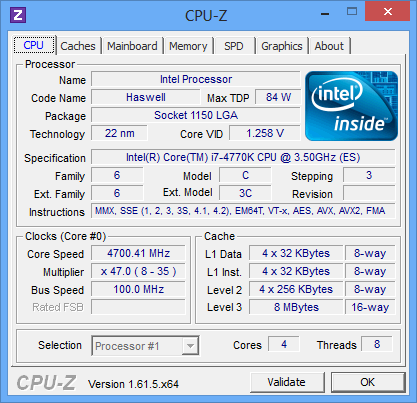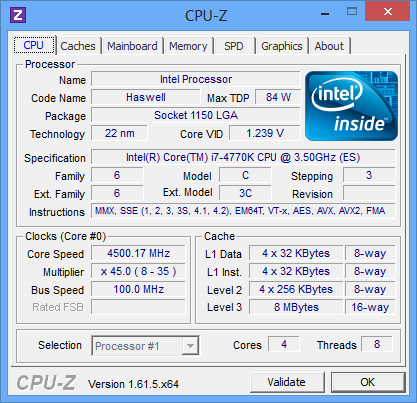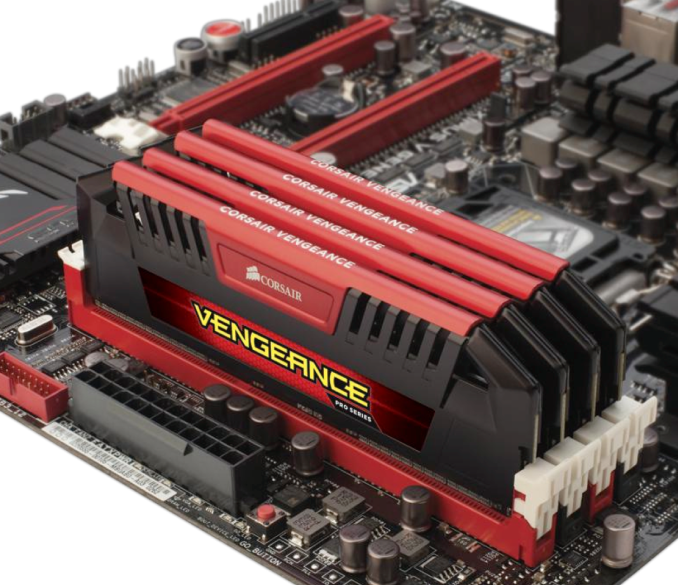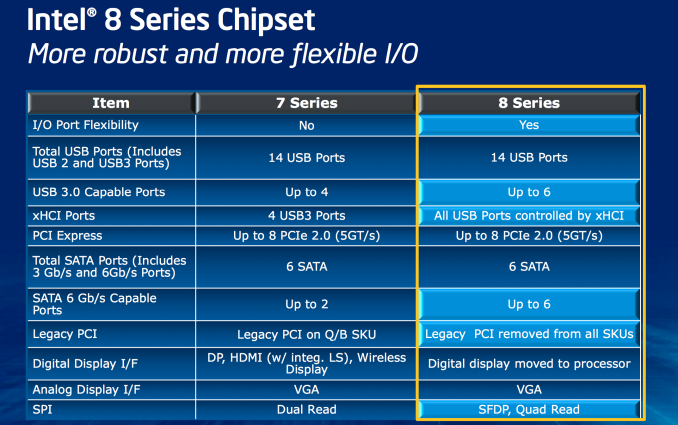The Haswell Review: Intel Core i7-4770K & i5-4670K Tested
by Anand Lal Shimpi on June 1, 2013 10:00 AM ESTMemory
Haswell got an updated memory controller that’s supposed to do a great job of running at very high frequencies. Corsair was kind enough to send over some of its Vengeance Pro memory with factory DDR3-2400 XMP profiles. I have to say, the experience was quite possibly the simplest memory overclocking I’ve ever encountered. Ivy Bridge was pretty decent at higher speeds, but Haswell is a different beast entirely.
Although I used DDR3-2400 for most of my testing, Corsair’s Vengeance Pro line is available in frequencies rated all the way up to 2933MHz.
Platform
Haswell features a new socket (LGA-1150). Fundamental changes to power delivery made it impossible to maintain backwards compatibility with existing LGA-1155 sockets. Alongside the new socket comes Intel’s new 8-series chipsets.
At a high level the 8-series chipsets bring support for up to six SATA 6Gbps and USB 3.0. It’s taken Intel far too long to move beyond two 6Gbps SATA ports, so this is a welcome change. With 8-series Intel also finally got rid of legacy PCI support.
Overclocking
Despite most of the voltage regulation being moved on-package, motherboards still expose all of the same voltage controls that you’re used to from previous platforms. Haswell’s FIVR does increase the thermal footprint of the chip itself, which is why TDPs went up from 77W to 84W at the high-end for LGA-1150 SKUs. Combine higher temperatures under the heatspreader with a more mobile focused chip design, and overclocking is going to depend on yield and luck of the draw more than it has in the past.
Haswell doesn’t change the overclocking limits put in place with Sandy Bridge. All CPUs are frequency locked, however K-series parts ship fully unlocked. A new addition is the ability to adjust BCLK to one of three pre-defined straps (100/125/167MHz). The BCLK adjustment gives you a little more flexibility when overclocking, but you still need a K-SKU to take advantage of the options.


In terms of overclocking success on standard air cooling you should expect anywhere from 4.3GHz - 4.7GHz at somewhere in the 1.2 - 1.35V range. At the higher end of that spectrum you need to be sure to invest in a good cooler as you’re more likely to bump into thermal limits if you’re running on stable settings.

















210 Comments
View All Comments
winterspan - Monday, June 3, 2013 - link
So, can someone catch me up with why Haswell isn't being compared to the older Core i7-39xx Sandy Bridge chips with 6 cores (Sandy Bridge E series)? Is it because they are based on the Xeon architecture and thus are not directly comparable? Will we see an Haswell-E (or Ivy Bridge E) series-based Core i7 with more than 4 cores as a follow-up to the Core i7-39xx?TomWomack - Monday, June 3, 2013 - link
Yes, Ivy Bridge E should appear in the fall; it's not at present quite clear how many cores it will have, possibly only six with the 8- and 12-core units reserved for sale as Xeons.Asking anandtech.com/bench to compare a 4770K and a 3930X, Haswell wins on single-thread and loses on some multi-thread tests, which is what you'd expect.
Kevin G - Monday, June 3, 2013 - link
Probably because it'd be embarrassed in some cases. For lightly threaded workloads, the i7 4770k would come out on top. The six core i7 39xx chips need heavily threaded applications to really shine. Also of note is that GT3e versions of Haswell have 128 MB of L4 cache which further improves IPC. A hypothetical 3.5 Ghz fully functional Haswell with GT3e and recompiled software will likely out run an 8 core socket 2011 Xeon.boe - Monday, June 3, 2013 - link
Pretty much a big steaming pile of meh.They should have at least put more PCIe lanes on the thing otherwise it is just last years processor by another name.
milkod2001 - Monday, June 3, 2013 - link
What revision of i7-4770K was tested here? There's been rumors about early Haswell revisions giving some problems to usb3 connected devices. When in sleep mode it can't wake up after that:http://www.tomshardware.com/news/Haswell-USB-3.0-S...
Would love to see some additional tests covering this problems to make sure I won't spend weeks sending faulty CPU back, waiting and all that s..t.
Diogenes5 - Monday, June 3, 2013 - link
TIL that my 2-year-old i2500k still rocks it for the price and the overclock I have it at (beats any current gen processor for most tasks).Oscarcharliezulu - Monday, June 3, 2013 - link
Thx for the review Anand, as always very thoughtful and well written. You always have a good mix of objective and intelligent subjective. Looking forward to Ivy-E now.psuedonymous - Monday, June 3, 2013 - link
Dangit Anand! Why are you still using 2-pass encoding? Everyone and their dog have switched to the faster and more effective CRF. It may have some obscure use as a synthetic benchmark, but it's certainly not a real world one!skrewler2 - Monday, June 3, 2013 - link
Pretty annoying they're still not including VT-d support in their K series.SanX - Monday, June 3, 2013 - link
Anand gets on my nerves lately. Smells like shill articles everything he personally covers.